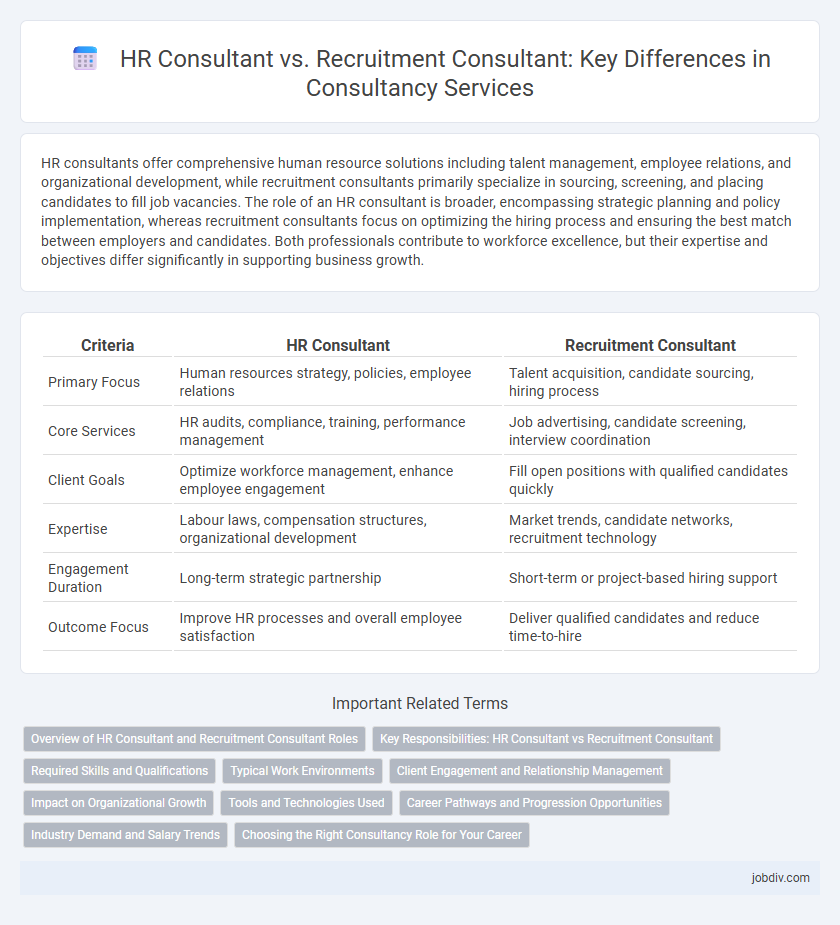HR consultants offer comprehensive human resource solutions including talent management, employee relations, and organizational development, while recruitment consultants primarily specialize in sourcing, screening, and placing candidates to fill job vacancies. The role of an HR consultant is broader, encompassing strategic planning and policy implementation, whereas recruitment consultants focus on optimizing the hiring process and ensuring the best match between employers and candidates. Both professionals contribute to workforce excellence, but their expertise and objectives differ significantly in supporting business growth.
Table of Comparison
| Criteria | HR Consultant | Recruitment Consultant |
|---|---|---|
| Primary Focus | Human resources strategy, policies, employee relations | Talent acquisition, candidate sourcing, hiring process |
| Core Services | HR audits, compliance, training, performance management | Job advertising, candidate screening, interview coordination |
| Client Goals | Optimize workforce management, enhance employee engagement | Fill open positions with qualified candidates quickly |
| Expertise | Labour laws, compensation structures, organizational development | Market trends, candidate networks, recruitment technology |
| Engagement Duration | Long-term strategic partnership | Short-term or project-based hiring support |
| Outcome Focus | Improve HR processes and overall employee satisfaction | Deliver qualified candidates and reduce time-to-hire |
Overview of HR Consultant and Recruitment Consultant Roles
HR consultants specialize in developing and optimizing human resource strategies, including employee relations, performance management, and compliance with labor laws, to enhance overall organizational effectiveness. Recruitment consultants focus on sourcing, interviewing, and placing qualified candidates in suitable job roles, streamlining the hiring process for companies. Both roles are essential in workforce management but differ in their core functions, with HR consultants addressing broader HR policies and recruitment consultants targeting talent acquisition.
Key Responsibilities: HR Consultant vs Recruitment Consultant
HR consultants specialize in developing comprehensive workforce strategies, overseeing employee relations, performance management, and compliance with labor laws to enhance organizational effectiveness. Recruitment consultants concentrate on sourcing, screening, and placing candidates, managing talent pipelines, and collaborating with hiring managers to meet staffing requirements efficiently. Both roles drive human capital optimization, but HR consultants emphasize strategic human resource planning, while recruitment consultants focus on talent acquisition processes.
Required Skills and Qualifications
HR consultants require deep knowledge in employee relations, organizational development, and HR laws, often holding certifications such as SHRM-CP or CIPD. Recruitment consultants specialize in talent acquisition strategies and candidate screening, necessitating skills in negotiation, market research, and proficiency with applicant tracking systems (ATS). Both roles demand strong communication and interpersonal skills but vary in focus, with HR consultants emphasizing policy implementation and recruitment consultants driving candidate placement.
Typical Work Environments
HR consultants typically operate within corporate offices, human resource departments, or as part of consultancy firms advising on organizational development, compliance, and employee management. Recruitment consultants frequently work in agency settings, recruitment firms, or on-site with clients to source, screen, and place candidates. Both roles may involve remote work, but recruitment consultants often spend significant time in client meetings and networking events to identify talent.
Client Engagement and Relationship Management
HR consultants specialize in developing comprehensive client engagement strategies by assessing organizational needs, optimizing workforce planning, and enhancing employee satisfaction to build long-term relationships. Recruitment consultants focus primarily on client relationship management through talent acquisition, candidate sourcing, and matching skills to specific job requirements, ensuring efficient hiring processes. Both roles require strong interpersonal skills, but HR consultants emphasize strategic partnership, while recruitment consultants prioritize transactional client interactions.
Impact on Organizational Growth
HR consultants drive organizational growth by optimizing workforce strategies, enhancing employee engagement, and improving talent management frameworks. Recruitment consultants focus on accelerating growth through targeted talent acquisition, reducing hiring cycles, and securing high-caliber candidates aligned with business goals. Both roles contribute to sustainable growth, with HR consultants emphasizing long-term development and recruitment consultants supporting immediate staffing needs.
Tools and Technologies Used
HR consultants leverage comprehensive human resource management systems (HRMS) like SAP SuccessFactors and Workday to optimize employee lifecycle, performance analytics, and compliance management. Recruitment consultants utilize applicant tracking systems (ATS) such as Greenhouse and Lever, along with sourcing tools like LinkedIn Recruiter and AI-driven candidate matching platforms, to streamline talent acquisition processes. Both roles increasingly adopt data analytics and AI tools to enhance decision-making and improve client outcomes in the consultancy domain.
Career Pathways and Progression Opportunities
HR consultants specialize in strategic workforce planning, talent management, and organizational development, offering diverse career pathways into senior HR management and HR business partnership roles. Recruitment consultants focus on talent acquisition, candidate sourcing, and client relationship management, with progression opportunities toward recruitment team leadership, talent acquisition director, or specialized headhunter positions. Both paths provide distinct skill developments and advancement prospects aligned with organizational human capital strategies versus talent acquisition expertise.
Industry Demand and Salary Trends
HR consultants primarily focus on organizational development, employee relations, and performance management, while recruitment consultants specialize in talent acquisition and candidate placement. Industry demand for HR consultants is rising due to growing emphasis on workplace culture and compliance, with average salaries ranging from $70,000 to $110,000 annually. Recruitment consultants experience high demand in sectors like technology and healthcare, earning average salaries between $60,000 and $100,000, with commission-based incentives often driving total compensation higher.
Choosing the Right Consultancy Role for Your Career
HR Consultants specialize in optimizing organizational practices, employee relations, and compliance strategies, whereas Recruitment Consultants focus on talent acquisition, candidate sourcing, and hiring processes. Selecting the right consultancy role depends on your passion for either strategic human resource management or dynamic recruitment and placement activities. Understanding the distinct responsibilities and skill sets of each role ensures alignment with your career goals in the consultancy industry.
HR Consultant vs Recruitment Consultant Infographic

 jobdiv.com
jobdiv.com